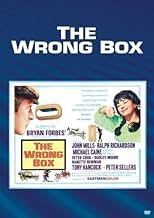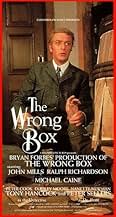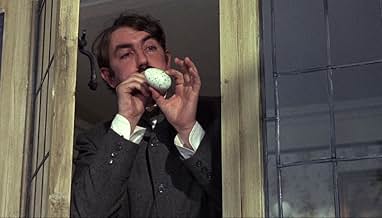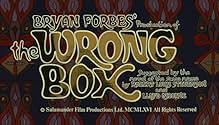VALUTAZIONE IMDb
6,7/10
4222
LA TUA VALUTAZIONE
Aggiungi una trama nella tua linguaIn Victorian England, a fortune now depends on which of two brothers outlives the other, or can be made to have seemed to do so.In Victorian England, a fortune now depends on which of two brothers outlives the other, or can be made to have seemed to do so.In Victorian England, a fortune now depends on which of two brothers outlives the other, or can be made to have seemed to do so.
- Regia
- Sceneggiatura
- Star
- Ha vinto 1 BAFTA Award
- 1 vittoria e 2 candidature totali
Recensioni in evidenza
10vox-sane
The quiet little black comedy "The Wrong Box" has a superb cast. Veteran British stage/cinema actors (Ralph Richardson, John Mills, Wilfred Lawson) play with rising stars (Michael Caine, just off "Alfie", and Peter Cook & Dudley Moore from the groundbreaking "Beyond the Fringe" revue). Established comic actors (Peter Sellers, Tony Hancock) give performances that carefully-polished little gems. Even the tiniest "blink and you'll miss 'em" roles are loaded with familiar character actors (Cicely Courtneidge, John Le Mesurier, Thorley Walters &c) rubbing elbows with rising talents (Jeremy Lloyd, James Villiers, Leonard Rossiter, Graham Stark) making the movie a veritable field day for spotters of British humor. The performances in the major roles are all solid. Some of the smaller parts have variable performances: Thorley Walters is delightful, Courtneidge, too overbearing). All the actors seem to realize that they must take this sort of comedy seriously -- mugging kills this sort of humor. The leads (Richardson, Mills, Cook, Moore, Caine, Lawson) are all suitably earnest. Only Nanette Newman (the director's wife) doesn't seem quite up to her part, being a better actress in modern dress; but she's quite pretty enough and she's good enough not to be utterly lost even in this ensemble of extremely talented actors.
The humor is quiet, with a Victorian hush over the proceedings, lending a (perhaps tongue in cheek) funereal respect to its theme of death with laughter. The gentle pace picks up near the end with a chase with hearses and beer wagons, and a climax that gathers all the principles in a cemetery in a satisfying conclusion.
The witty script is filled with little bits that might not register at first (such as the pulse bit, or "Can you speak a little lower" and the peculiar words "unnecessarily mutilated"). Some of the sight gags go askew, but enough of them work to make them worth while. It's not a movie for every taste. Anglophiles and those who appreciate an easy-going humor may find it work a peek. Anyone who loves Peter Sellers has to see his Pratt.
The humor is quiet, with a Victorian hush over the proceedings, lending a (perhaps tongue in cheek) funereal respect to its theme of death with laughter. The gentle pace picks up near the end with a chase with hearses and beer wagons, and a climax that gathers all the principles in a cemetery in a satisfying conclusion.
The witty script is filled with little bits that might not register at first (such as the pulse bit, or "Can you speak a little lower" and the peculiar words "unnecessarily mutilated"). Some of the sight gags go askew, but enough of them work to make them worth while. It's not a movie for every taste. Anglophiles and those who appreciate an easy-going humor may find it work a peek. Anyone who loves Peter Sellers has to see his Pratt.
Funny and often laugh out loud hilarious story of two brothers (John Mills and Ralph Richardson), one of whom must outlive the other in order to win a Tontine started at their boys school and going to the final survivor of the class. What transpires is "The Wrong Box," a 1966 film directed by Bryan Forbes and also starring Michael Caine, Peter Cook, Dudley Moore, Wilfred Lawson, Nanette Newman (Mrs. Forbes) and Peter Sellers.
The first ten minutes or so of the movie is hilarious, as it shows the demise of the other students over the years. Regarding the surviving Finsbury brothers, one side of has Caine and his grandfather Mills, who is desperate to win, so he summons his brother to his "deathbed" in order to kill him, in one of the funniest scenes in the movie. On the other side, Cook and Moore are Richardson's nephews, who have devoted themselves to keeping their uncle alive. They needn't have bothered because he can't be killed anyway. He walks away from a train crash, but there's a mix-up, and he's believed dead. The nephews are desperate to cover this up until Mills dies. When they go to bury what they think is his body, Cook makes Moore do it rather than put his hands in the dirt, insisting "petal-soft hands are the mark of a great ornithologist."
Both Richardson, as the fact-spewing brother, and Mills, as the crazy old coot with murder in his heart, are excellent, as is the rest of the cast. Michael Caine is young and handsome here. Peter Sellers as a shady, cat-loving doctor is a riot. Wilfred Lawson, who plays Mills' butler, nearly steals the film as the elderly servant so old he practically has rigor mortis. One of the best moments is when Michael Caine sends him to the door telling him to go slowly - it already takes him ten minutes to get there, and Lawson starts to go to the door and mumbles to himself, "I'll slow it down." Too much. The pretty ingénue, Newman, had been married to director Forbes for ten years before the making of this film. She's still married to him.
Lots of fun, with a crazy finale befitting the film.
The first ten minutes or so of the movie is hilarious, as it shows the demise of the other students over the years. Regarding the surviving Finsbury brothers, one side of has Caine and his grandfather Mills, who is desperate to win, so he summons his brother to his "deathbed" in order to kill him, in one of the funniest scenes in the movie. On the other side, Cook and Moore are Richardson's nephews, who have devoted themselves to keeping their uncle alive. They needn't have bothered because he can't be killed anyway. He walks away from a train crash, but there's a mix-up, and he's believed dead. The nephews are desperate to cover this up until Mills dies. When they go to bury what they think is his body, Cook makes Moore do it rather than put his hands in the dirt, insisting "petal-soft hands are the mark of a great ornithologist."
Both Richardson, as the fact-spewing brother, and Mills, as the crazy old coot with murder in his heart, are excellent, as is the rest of the cast. Michael Caine is young and handsome here. Peter Sellers as a shady, cat-loving doctor is a riot. Wilfred Lawson, who plays Mills' butler, nearly steals the film as the elderly servant so old he practically has rigor mortis. One of the best moments is when Michael Caine sends him to the door telling him to go slowly - it already takes him ten minutes to get there, and Lawson starts to go to the door and mumbles to himself, "I'll slow it down." Too much. The pretty ingénue, Newman, had been married to director Forbes for ten years before the making of this film. She's still married to him.
Lots of fun, with a crazy finale befitting the film.
There are many reasons to enjoy this film. It is a catalogue of English comic and serious actors, Peter Cook and Dudley Moore not the least among them. But this show belongs to the bit players. Wilfrid Lawson as Peacock is superb. I hope he garnered enough attention from this role to cap off his career. Bit and character players are a special breed.
The film is vaguely psychedelic. The art nouveau lettering on title cards fits in with the Haight Ashbury tone of the times. The plot is solid and humorous throughout yet it depends on the basic slapstick for its conclusion.
Well-written, well-acted, well-directed, well-conceived. A treat.
The film is vaguely psychedelic. The art nouveau lettering on title cards fits in with the Haight Ashbury tone of the times. The plot is solid and humorous throughout yet it depends on the basic slapstick for its conclusion.
Well-written, well-acted, well-directed, well-conceived. A treat.
Robert Louis Stevenson wrote novels that studied character and its flaws: Long John Silver in "Treasure Island", Aleck Breck Stewart in "Kidnapped" and "David Balfour", James and Henry Durie in "The Master Of Ballentrae", Dr. Henry Jeckyll/Mr. Edward Hyde.... His best novels show the ambiguity of character. Yet with his interest in melodramatics he should have been a natural for writing mystery and detective stories, like his contemporaries Conan Doyle, Gilbert Chesterton, and Ernest Brahmah. They concentrated their gifts on character developments on their central story figures (Holmes and Watson, Father Brown, Max Carrados), but the basic plot development is what pulls the story along for all of them. Stevenson pulled the story plot to develop the characters instead.
Except once - "The Wrong Box". It is Stevenson's spoof on mystery and detective fiction. It was not his novel alone, but the first of three he wrote with his stepson Lloyd Osborne (to whom he told the story of "Treasure Island" before he wrote it down). Stevenson is telling the story of Masterman and Joseph Finsbury, the last two survivors of a special type of insurance form called a "tontine". It's an elaborate wager where a bunch of people put up a sum of money individually, and the last survivor gets the bulk of it. Masterman is home bound, and Joseph is a lively old bore who loves to talk and show off his preposterous knowledge of trivia (Ralph Richardson brings out the fact about the word "whip" when riding with a man holding a "whip"). Masterman (John Mills) lives with his grandson Michael (Michael Caine), and Joseph with his two greedy nephews (Morris and John - Peter Cook and Dudley Moore) and his niece Julia (Nanette Newman). Joseph does not really care about the tontine, but Masterman wants it - and is willing to speed the demise of Joseph to do it. Morris and John have to keep Joseph alive (which is not unlikely - he is in good health). Michael is not quite sure what is going on with his irascible grandfather, and Julia just knows she dislikes her two cousins Morris and John (but she really likes Michael). So the stage is set for the comedy. Along the way we meet other characters who are colorful: Dr. Pratt (Peter Sellers) - who at the drop of a hat will tell you about how he fell from medical grace to the backstreet he resides in; Peacock (Wilfred Lawson), Masterman's butler, who makes the average turtle look like it's turbocharged; the police Detective (Tony Hancock) - who can't put together a coherent idea if his life depended on it; and ...the Bournmouth Strangler (the story is from 1888, so we can guess who this character is based on).
It is a marvelous send-up on Victorian England, taking in the empire (notice the beginning when we see the demises of various members of the tontine), to the problems of railway traffic, talkative relatives, and body disposal in London in the 1880s. That the novel is not quite like the film does not matter (Michael is not a medical student but a clever barrister in the story, and John's relationship with Morris deteriorates in the story due to some money troubles), but this does not matter. It is a fun movie and well worth seeing.
Except once - "The Wrong Box". It is Stevenson's spoof on mystery and detective fiction. It was not his novel alone, but the first of three he wrote with his stepson Lloyd Osborne (to whom he told the story of "Treasure Island" before he wrote it down). Stevenson is telling the story of Masterman and Joseph Finsbury, the last two survivors of a special type of insurance form called a "tontine". It's an elaborate wager where a bunch of people put up a sum of money individually, and the last survivor gets the bulk of it. Masterman is home bound, and Joseph is a lively old bore who loves to talk and show off his preposterous knowledge of trivia (Ralph Richardson brings out the fact about the word "whip" when riding with a man holding a "whip"). Masterman (John Mills) lives with his grandson Michael (Michael Caine), and Joseph with his two greedy nephews (Morris and John - Peter Cook and Dudley Moore) and his niece Julia (Nanette Newman). Joseph does not really care about the tontine, but Masterman wants it - and is willing to speed the demise of Joseph to do it. Morris and John have to keep Joseph alive (which is not unlikely - he is in good health). Michael is not quite sure what is going on with his irascible grandfather, and Julia just knows she dislikes her two cousins Morris and John (but she really likes Michael). So the stage is set for the comedy. Along the way we meet other characters who are colorful: Dr. Pratt (Peter Sellers) - who at the drop of a hat will tell you about how he fell from medical grace to the backstreet he resides in; Peacock (Wilfred Lawson), Masterman's butler, who makes the average turtle look like it's turbocharged; the police Detective (Tony Hancock) - who can't put together a coherent idea if his life depended on it; and ...the Bournmouth Strangler (the story is from 1888, so we can guess who this character is based on).
It is a marvelous send-up on Victorian England, taking in the empire (notice the beginning when we see the demises of various members of the tontine), to the problems of railway traffic, talkative relatives, and body disposal in London in the 1880s. That the novel is not quite like the film does not matter (Michael is not a medical student but a clever barrister in the story, and John's relationship with Morris deteriorates in the story due to some money troubles), but this does not matter. It is a fun movie and well worth seeing.
Sixties take offs of the Victorian era are usually very entertaining. All of the clichés of repression and morbidity are always very over the top and they are here. A woman falls madly in love with a man when she sees his arms, the salvation army stick their nose into everything. It is perhaps more insightful into the sixties than anything! This is by no means a master piece, frankly with such a stellar cast it is rather disappointing. The script tries too hard to be funny and the gags come too thick and fast , especially at the end, for the viewer to be able to follow, certainly it is very unlike the slower, more leisurely pace of Stevenson's book.
However it is certainly worth watching. If nothing else it contains one of my favourite lines ever 'Listen to me all you eggs'!
However it is certainly worth watching. If nothing else it contains one of my favourite lines ever 'Listen to me all you eggs'!
Lo sapevi?
- QuizPeter Cook's wife, Wendy was nine months pregnant when filming began. Producer and director Bryan Forbes promised them that he would let Peter leave the set as soon as Wendy went into labor. He kept his word, and Peter made it to the hospital just in time for the birth of his daughter, Daisy. Forbes, Dudley Moore, Sir Michael Caine, and Peter Sellers filled his dressing room with flowers and champagne, in celebration of Daisy's birth, when he returned to work.
- BlooperThe Victorian-age London houses have TV antennae on them.
- Citazioni
[the doctor, owner of dozens of cats, is coughing]
Doctor Pratt: I'm all right; it's just a fur ball; it's nothing. Strangely, I haven't had fur for a fortnight.
- Curiosità sui crediti"Certain Funereal & Military Airs played by Her Majesty Queen Victoria's Temperance Seven (who actually number eight)"
- ConnessioniFeatured in Hollywood: The Gift of Laughter (1982)
- Colonne sonoreLight of Head
Written by Clifford Bevan
I più visti
Accedi per valutare e creare un elenco di titoli salvati per ottenere consigli personalizzati
- How long is The Wrong Box?Powered by Alexa
Dettagli
- Data di uscita
- Paese di origine
- Siti ufficiali
- Lingue
- Celebre anche come
- La caja equivocada
- Luoghi delle riprese
- Royal Crescent, Bath, Somerset, Inghilterra, Regno Unito(Finsbury residences)
- Azienda produttrice
- Vedi altri crediti dell’azienda su IMDbPro
Botteghino
- Lordo in tutto il mondo
- 15 USD
- Tempo di esecuzione1 ora 45 minuti
- Mix di suoni
- Proporzioni
- 1.66 : 1
Contribuisci a questa pagina
Suggerisci una modifica o aggiungi i contenuti mancanti

Divario superiore
By what name was La cassa sbagliata (1966) officially released in India in English?
Rispondi





































